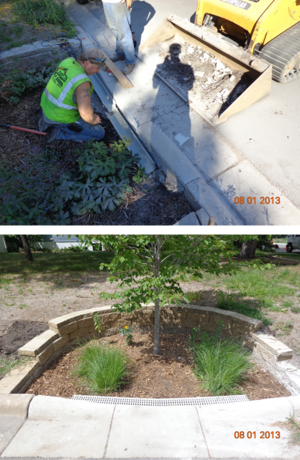
Difference between revisions of "Pretreatment"
m () |
m |
||
| Line 1: | Line 1: | ||
= = | = = | ||
| − | {{alert|It is strongly recommended that pretreatment devices be certified through [https://ecology.wa.gov/Regulations-Permits/Guidance-technical-assistance/Stormwater-permittee-guidance-resources/Emerging-stormwater-treatment-technologies Washington State's TAPE] or [http://www.njcat.org/ New Jersey's NJCAT] programs, be modeled using [https://upstreamtechnologies.us/products/SAFL/shsam.shtml SHSAM], or follow guidance in this manual for [https://stormwater.pca.state.mn.us/index.php?title=Design,_construction,_operation_and_maintenance_specifications_for_pretreatment_vegetated_filter_strips vegetated filter strips] and [https://stormwater.pca.state.mn.us/index.php?title=Design_criteria_for_stormwater_ponds#Pretreatment forebays].}} | + | {{alert|It is strongly recommended that pretreatment devices be certified through [[https://ecology.wa.gov/Regulations-Permits/Guidance-technical-assistance/Stormwater-permittee-guidance-resources/Emerging-stormwater-treatment-technologies Washington State's TAPE]] or [http://www.njcat.org/ New Jersey's NJCAT] programs, be modeled using [https://upstreamtechnologies.us/products/SAFL/shsam.shtml SHSAM], or follow guidance in this manual for [https://stormwater.pca.state.mn.us/index.php?title=Design,_construction,_operation_and_maintenance_specifications_for_pretreatment_vegetated_filter_strips vegetated filter strips] and [https://stormwater.pca.state.mn.us/index.php?title=Design_criteria_for_stormwater_ponds#Pretreatment forebays].}} |
[[file:St cloud pretreatment.png|300px|thumb|alt=photo of a pretreatment device for a bioretention practice in St. Cloud, MN|<font size=3>Pretreatment concept developed by the City of Eagan, modified and implemented by the City of St. Cloud. Two 5 inch by 40 inch channel drains bolted to the back of the curb. Construction adhesive used where concrete and drains meet; weep holes drilled in bottom of drains. Maintenance completed by removing screws with cordless drill, then the grates and scooping out sediment/debris. Hex head screws required. this is a cost-effective BMP for small surface infiltration practices and can be easily used for retrofits. Photo courtesy of the City of St. Cloud.</font size>]] | [[file:St cloud pretreatment.png|300px|thumb|alt=photo of a pretreatment device for a bioretention practice in St. Cloud, MN|<font size=3>Pretreatment concept developed by the City of Eagan, modified and implemented by the City of St. Cloud. Two 5 inch by 40 inch channel drains bolted to the back of the curb. Construction adhesive used where concrete and drains meet; weep holes drilled in bottom of drains. Maintenance completed by removing screws with cordless drill, then the grates and scooping out sediment/debris. Hex head screws required. this is a cost-effective BMP for small surface infiltration practices and can be easily used for retrofits. Photo courtesy of the City of St. Cloud.</font size>]] | ||
Revision as of 20:17, 27 May 2021

The Manual user will notice that many of the stormwater practices discussed in this Manual recommend pretreatment as an integral part of the BMP application. In fact, in many applications (ex. infiltration, stormwater ponds), the BMP would not be properly used if pre-treatment is ignored. The simple reason for the use of pretreatment techniques is the necessity to keep a BMP from being overloaded, primarily by sediment. Pretreatment can also be used to dampen the effects of high or rapid inflow, dissipate energy, and provide additional storage. All of these ancillary benefits help BMP performance.
Pretreatment is a required part of infiltration and filtration practices covered under the Minnesota Construction Stormwater General Permit. This manual describes three general types of pretreatment practices - settling devices, screens, and vegetated filter strips. These are described on the pages below.
- NEW! Pretreatment selection tool
- Overview and methods of pretreatment
- Overviews for different types of pretreatment practices
- Information for specific types of pretreatment practices
- Design, construction, operation and maintenance specifications for pretreatment vegetated filter strips
- NEW! Pretreatment - Hydrodynamic separation devices
- NEW! Pretreatment - Screening and straining devices, including forebays
- NEW! Pretreatment - Above ground and below grade storage and settling devices
- NEW! Pretreatment - Filtration devices and practices
- NEW! Pretreatment - Other pretreatment water quality devices and practices
- To see the above pages as a single page, link here
- NEW! Pretreatment sizing for basins and filters strips
- NEW! Technical basis for pretreatment sizing for basins and filter strips
Tables
NEW!
- Pretreatment tables - link to tabled information for pretreatment practices
- Hydrodynamic separator tables
- Screening and straining devices tables
- Above ground and below grade storage and settling tables
- Filtration tables
- Other water quality devices tables
Other information and links
- Pretreatment - Additional considerations
- NEW! Case studies for pretreatment
- References for pretreatment
- Links for pretreatment
- Definitions for pretreatment
- Supporting material for pretreatment
- Photo gallery for pretreatment
The following page was previously included in this pretreatment section of the manual. Much of this information has been updated and the reader is encouraged to use the information in the updated sections, shown in the above Table of Contents. However, there may be some useful information on this page. We hope to eventually update the information on this page. Flow-through structures for pre-treatment